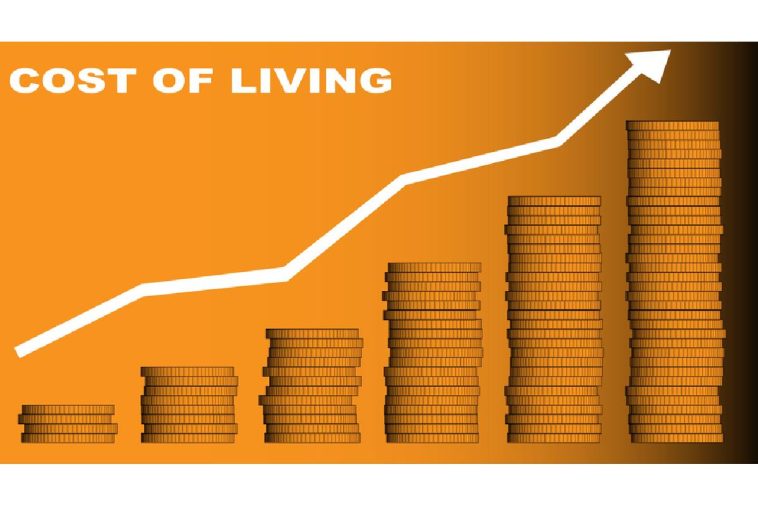Why is the Cost of Living Rising? – There are many reasons why the cost of living is rising. It is rising due to various factors, including inflation, increasing demand for goods and services, rising housing costs, higher energy prices, and wage stagnation. These factors contribute to the overall price increase, making it more expensive for people to meet their everyday needs.
Some of the Most Common Causes For the Rising Cost of Living
1. Inflation:

Inflation is the general increase in prices and falls in the purchasing power of money. You can typically measure it as a percentage change in the Consumer Price Index (CPI), a basket of goods and services commonly purchased by households. When inflation rises, people need more money to buy the same things.
2. Supply Chain Disruptions:
The COVID-19 pandemic has caused significant disruptions to global supply chains. It has led to shortages of goods and services, pushing prices.
3. Increased Demand:
The global economy is recovering from the COVID-19 pandemic, and demand for goods and services is rising. It is also putting upward pressure on prices.
4. Increased Energy Prices:
Energy prices have been rising in recent months due to several factors, including the war in Ukraine. It is also contributing to the rising cost of living.
5. Wage Stagnation:
Wages have not been keeping up with the rising cost of living in recent years. It means that people must spend more of their income on essentials, leaving less money for discretionary spending.
The rising cost of living is a significant concern for many people, and it is essential to be aware of the factors contributing to the rise in prices and to take steps to protect your finances. Some tips for coping with the rising cost of living include:
Create a budget: A budget can help you track your spending and prevent overspending.
1. Cut Back on Unnecessary Expenses:
Take a close look at your spending and identify areas where you can cut back. It may include eating out less, canceling unused subscriptions, or finding cheaper alternatives to your current expenses.
2. Increase Your Income:
If possible, look for ways to increase your revenue. It may mean getting a part-time job, starting a side hustle, or asking for a raise at work.
3. Save Money:
It is crucial to have a savings cushion to help you cover unexpected expenses. Try to save at least 3-6 months of living expenses.
4. Get Help if You Need it:
If you are struggling to make ends meet, resources are available to help you. You may be able to get help from your government, a charity, or a non-profit organization.
What is Inflation?
Inflation is a general increase in prices and a fall in the purchasing power of money. You can measure it as a percentage change in the Consumer Price Index (CPI), a basket of goods and services commonly purchased by households. When inflation rises, people need more money to buy the same things.
Inflation is the result of several factors, including:
1. Increased Demand:
Prices tend to rise when demand for goods and services increases, and it can happen when the economy is growing or there is a shortage of goods and services.
2. Increased Supply Costs:
When the cost of producing goods and services increases, prices tend to rise. It can happen when the cost of raw materials, labor, or energy increases.
3. Government Policies:
Government policies can also affect inflation. For example, if the government prints too much money, it can lead to inflation.
Inflation can have many adverse effects on an economy, including:
1. Reduced Purchasing Power:
When inflation rises, people’s purchasing power declines. It means that they can buy less with the same amount of money.
2. Increased Uncertainty:
Inflation can lead to increased tension in the economy. It can make it difficult for businesses to plan for the future and can lead to investment and job losses.
3. Social Unrest: Inflation
an lead to social unrest, and it is because people may become frustrated with the rising cost of living and demand action from the government.
Many things can control inflation; they include:
1. Monetary Policy: The central bank can use monetary policy to control inflation. It can involve raising interest rates or selling government bonds.
2. Fiscal Policy: The government can use fiscal policy to control inflation. It can involve raising taxes or cutting spending.
3. International Cooperation: Countries can cooperate to control inflation, which can involve agreeing to coordinate their monetary and fiscal policies.
Inflation is a complex issue, and there is no easy solution. However, by understanding the causes of inflation and the measures that can be implemented to control it, we can help to mitigate its harmful effects.
Frequently Asked Questions
1. How much does it cost to live in India?
The cost of living in India varies according to city. Tier-1 cities like Mumbai, New Delhi, Bengaluru, and Chennai are often more expensive, but tier-2 and tier-3 cities are less expensive.
2. What is an example of a cost of living example?
The cost of living comprises a variety of expenses such as food, clothing, shelter, utility services, healthcare, education, and so on.
3. How much does it cost to live in India monthly?
Monthly expenses in India, like anyplace else, involve various charges such as food, housing, healthcare, education, utility bills, and so on.
Conclusion
Even if product prices and the cost of living, in general, remain a source of anxiety, there is some good news. In December 2022, retail inflation fell to 5.72%, a one-year low. In addition, retail inflation predicts to fall to 5% by March 2023.
However, having a watertight budget and analyzing your expenses regularly is critical to inflation-proofing your money. You may use Fi’s AI-powered money management feature, Analyser, to track your spending and maximize your savings regardless of inflation.




GIPHY App Key not set. Please check settings